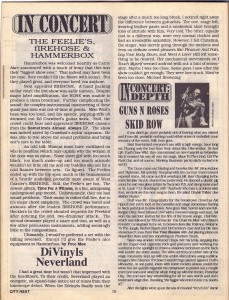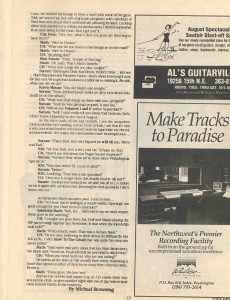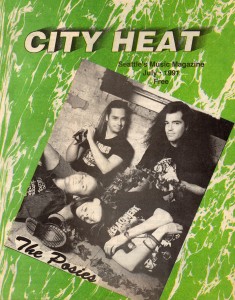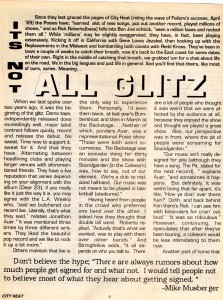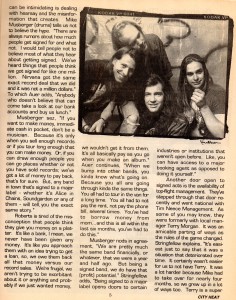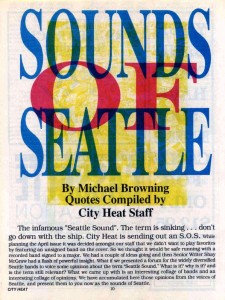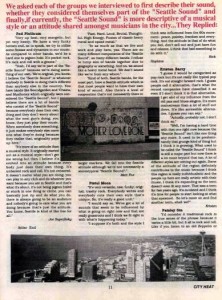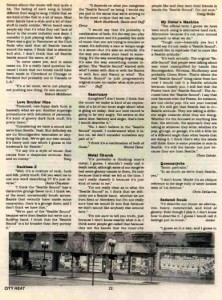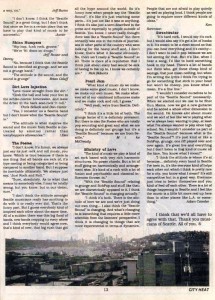DiVinyls & Neverland at The Moore
Guns N Roses & Skid Row at The Tacoma Dome interview
War Babies & Red Platinum at Mad Dogs/Farside
Best Kissers In The World & Hammerbox at RKCNDY
The Bogeymen – There’s No Such Thing As…
Ed-E Roland – Ed-E Roland (soon to be Collective Soul)
Peter Fosso – Peter Fosso
Panic: “Reaching Epidemic Proportion” [City Heat – August 1991]
As the latest band on this fair city’s “signed” roster to release an album (Epidemic) delightfully devoid of trademark grunge, Panic readies for the headlong plunge into the mosh pit that is “thrash metal” with the intent to ride out the set by adding their own little twist to an already twisted genre. That twist is a blues groove undercurrent to the heavy metal rapids above, flowing into an ocean of sound and power that fluctuates with each listen.
Birthed a half dozen years ago between vocalist Jeff Braimes and bassist George Hernandez, they first called the band Cold Steel. About the same time, guitarist Martin Chandler and drummer Jack Coy were playing in Strychnine. When Strychnine disbanded, Marty joined Cold Steel and they changed the name to Panic. A demo or two later, Jack Coy came in to complete the Panic debut lineup.
Before their series of good breaks, Panic pounded the pavement and starved like most hard rock bands. Even with Some serious interest in their demo, they were too broke to dub any copies. With the financial backing of Lance Goodwin from Bubble Records, they did a run of cassette tapes and began mailing them out to labels but as many musicians know and Jeff indicates, “without representation or connections…it’s not really talent or songs or any of that. It’s timing, who you know and maybe, how you look.”
Well they apparently had something or other in their favor for shortly thereafter, with a demo called Sex And Violence, they began making some very influential friends. People like the original Metal Shop mistress, KISW’s Kathy Faulkner and Lora Porter of Combat Records. Lora was such a good friend that she got Panic’s cut Morbid Curiosities on the Z-Rock national network, where it became a regular on Mike Paine’s Headbanger’s Heaven. Not bad for a song off an unsigned band’s demo tape. Unprecedented, in fact.
Then came N.A.M.A. 1990. Panic scored not only a nighttime club showcase but even a 20 minute slot at the actual convention (which didn’t go quite like imagined).
“It was just a really dry, weird thing. Here we thought this was our big break and we played first of all these bands in this really dry room full of people sitting on chairs. We thought we were going to knock ’em out and we died. It was terrible,” Jeff cries. As fortune would have it tho, the nighttime showcase at The Central is where ‘it’ happened.
Exodus guitarist Gary Holt came up to them after the set and told the sweaty crew, “I wanna produce you guys’ record!” Gary was in town for N.A.M.A., traveling with his manager, Toni Isabella of the legendary Bill Graham agency. Toni quickly took on a similar enthusiasm for the quartet and signed them up with BGA. Next assignment: get signed to a label.
Having the benefit of established management and their producer selected for a debut, Panic was pretty well able to take their business wherever they wanted. After six full months of label shopping plus negotiations, they ultimately penned their deal with Metal Blade. With as sweet a package as they had going, you might wonder, ‘why not a major label’? By choice.
Afraid of being swept aside within a corporate mechanism, they chose the intimacy of an independent, Jeff tells why. “The thing with Metal Blade is that they were offering the money that we needed. We had Rick (Hunolt, another Exodus guitarist) and Gary lined up to produce the record so that was going to cost us. It was going to cost us to do it in San Francisco because they had a room picked out to do it in and they wanted to do it with their engineer. [Exodus] being on Capital, they have major label standards and all [these costs] came with those connections so we had to have more money than independents usually give their bands, but we got enough [from them] to do it the way we wanted it.”
As Marty explains, “The more it evolved, the more it became a family type situation, everybody was real tight knit. We didn’t have to go thru a bunch of fuckin’ red tape to get things done. We didn’t even have to go thru an A&R rep, Toni just went straight to Brian [Slagel, of Metal Blade] who is the president. So we didn’t have to go thru any of that bullshit and it saved us a lot of time.”
After that, things just fell into place. Before they knew it, they were in a Bay City studio. Now they had to choose the songs for the big plunge, “For any band that’s been together for any length of time, a debut album usually represents a long period of time writing songs,” Jeff relates. “911 is a three year old song, and the newest on the album, High Strung, I mean, I was putting finishing touches on it while the tape was running. I hope that the newer songs aren’t any less heavy, but they probably are a little more diverse.”
Marty describes their style of song structuring, “Me and George come up with riffs and we compile them and make songs then give Jeff a tape and he writes lyrics to them. It’s a chemistry and concept that works real well…and it’s just always worked [that way] for us.” He goes on to describe Braimes’ lyrics as “anonymous observations of a world gone wrong.”
However, this doesn’t mean they’re bringing out the soap box. “So many metal lyrics are just thrown away to ‘whatever works,” Jeff laments. “I think lyrics are really important and I don’t [just] mean in terms of a message or anything political.” To which he adds, “I don’t have the time at this point to get too tied up about what’s going on in the world. It’s not that we don’t ever hope to have a social or political conscience, it’s just that I hope to grow into it honestly. I also think anybody in rock and roll deserves to have a period of time where they can just do it and not have the responsibility of raising someone else’s children. I realize that entertainer do, or can, have a big influence and even tho I think there’s a lot of fucked up things happening in the world and young people probably do need guidance right now. I’m still one of those young people.” Now there’s a shot of honesty for ya.
In fact, they’re pretty adamant about two things; their music and the honesty of same. “We don’t put ourselves in any category, we just do what we do and if people think that’s a cop out or sellout, they can pretty much fuck off. Music’s supposed to be a sea of change, you’re supposed to do what you want to do.” Marty, obviously proud of his surrounding mates, continues, “Seattle’s based on honesty. Queensryche do what they wanna do, Alice In Chains do what they wanna do, we do what we want, still everybody seems to have a different identifiable sound. In L.A. you’ve got a bunch of glam bands that look and sound the same. It’s not even like that here. Everybody’s doing their own thing and that’s what people respect you for. We don’t go too far out of our little sphere of our style on this album but we’re not afraid to try different stuff with our music. That’s the way it’s gonna be, that’s what this band is about.”
This band is also about the full frontal assault of their live show. With relatively scant touring under their belt (a few CA dates with Pantera) it will be interesting to see how they hold up when they join Reverend on tour at month’s end.
Can they maintain the in-your-face intensity night in and night out?
I do know one thing: they’ll give it their best.
Next week they’ll be filming the vid for Blackfeather Shake with Tom Ensign on the roof of The Paramount. Should make a good vantage point for watching the epidemic spread.
Hellfire Club
PO Box 80042
Seattle, WA 98108
Guns ‘N’ Roses/Skid Row – In Concert: In Depth, Hot Flashes, City Heat [August 1991]
If you didn’t go, you’re probably sick of hearing what you missed and if you did, probably nothing could either erase or embellish your memory of the event. Still, here goes.
Skid Row kicked everyone’s ass with a high energy, hour long set playing only the best from their debut like I Remember, 18 And Life, Youth Gone Wild, they concentrated on new material as Sebastian Bach sweated his way all over the stage.
Slave To The Grind, Get The Fuck Out and of course, Monkey Business particularly rocked my world. Solid sophomore effort stood it’s ground live this night!
The Guns came out blazing and heavies like Mr. Brownstone and Nightrain, fell quickly. Keeping with his current trend toward exposed shins, Axl came out first wearing a kilt later changing to the more familiar bicycle shorts (rose patterned). He donned a plastic pig snout he said was given to him by Tacoma’s P.D. and slung some mud at St Louis’ P.D. finishing it with,
“Anybody who has a problem with that we dedicate this next song to them. It’s called Double Talkin’ Jive Mother Fucker!”
Duff was “Mr. Congeniality” for the hometown crowd as Axl ripped over every inch of the catwalks and stage sometimes having to backpedal just to slow down. New guys Matt Sorem and now full-fledged Dizzy Reed infused GNR with a renewed energy and soul. Axl wore his patriotic leather for the first of the ‘movie songs’, Civil War, which was followed by T2s screamin’ You Could Be Mine with Dylan’s Knockin’ coming later in the set.
In between faves like Patience, Welcome To The Jungle, Rocket Queen and McCartney’s Live And Let Die they showcased tunes from Use Your Illusion with Axl playing piano on November Rain and Izzy vocalizing on Fourteen Years.
Slash was smokin’ in leather chaps over his Levis, stepping into all the hyper-cool cigarette rock god postures and working his sunburst in the spotlight to create a shadowy caricature on the back wall (under the shitty seats). The video screens on either side of the stage constantly kept up with the action often times using some fairly sublime imagery; like Slashes’ fretboard wanderings pasted against Duff’s silhouette.
At one point idiots with bottle rockets almost ended the show but Axl quickly regained his composure to pound out a couple more new ones and wind the whole thing up with the encore, Paradise City. The end saw Izzy windmilling for all he was worth and Axl’s trademark stage dive, thanking “the faggot who tried to tear my shorts off.” .
After the lights went up on the sea of crushed “recyclable” Dome cups, we headed backstage to have a word with some of the guys.
Well, we wound up in a sort of groupie purgatory with members of Skid Row and about thirty aesthetically pleasing females. Lacking either rock stardom or a certain curvaceousness, I did feel somewhat ill-at-ease being in this cattle run of a squeeze room.
But I got over it.
City Heat: “Hey, hey, what’s that you guys are listening to back there?”
Slash: “Alice In Chains.”
CH: “What else do you listen to backstage or on the road?”
Slash: “Alice In Chains.”
CH: “Anything else?”
Matt Sorum: “Yeah, Temple Of The Dog.”
Slash: “Oh yeah. That’s Matt’s favorite.”
CH: “What new songs did you play tonight?”
Sorum: “Estranged. Dust And Bones. Perfect Crime… lets see … Bad Obsession and Fourteen Years—that’s about how long it took for lzzy and Axl to get from Indiana to California to making it. Ah shit what else did we do?”
Karen Mason: “You did Matt’s solo tonight”
Sorum: “Yeah, (humble smile) we did a new drum solo, that’ll be on the album.”
CH: “What was Duff doing up there with you, tympani?”
Sorum: “Yeah he was playing tympani, it was fun.”
CH: “Will we see Volumes I and II before September?”
Sorum: “Well, I can’t really tell you about that because, fuck, I don’t know. Hopefully by the end of August”
As his voice trails off the last remark, I see the unspoken communication he’s making, and as I turn to look, I see that it’s with a very concerned brother who doesn’t seem to appreciate my electric accoutrements. As I try to make my mini cassette more inconspicuous…
Sorum: “That’s Earl. He’s very big and he will kill you. We’re cool Earl”
Mason: “We love Earl, he’s a very cool cat” (I hope so.-Ed.)
CH: “How’d you feel about the Puget Sound response?”
Sorum: “Rockin! Best show we’ve done since Philadelphia Spectrum.”
Mason: “Was that before St. Louis or after?”
Sorum: “Before.”
KM: (Justifying), “That was a fair question!”
CH: “How much longer does this deadly double bill last?”
Sorum: “Another two weeks then we take two off in LA before we hit it again with someone else. (Sensing the next question) I don’t know who yet.”
As Sebastian Bach saunters past, I turn to him…
CH: “So I hear you’re bailing in a couple weeks. Opening not good enough for you chart busters anymore?”
Sebastian Bach: “Nah, but… that’s not to say we won’t respect these guys in the morning.”
CH: I caught you guys (Sab, Axl, Duff and Slash) playing RIP Magazine’s [5th Anniversary party] stage together last November. Is that kind of when the friendship took hold?”
Bach: “Pretty much, yeah. [reflects] That was a fucken blast!”
CH: “By the way, (referring to their debut on Billboard’s Hot 200 at No. 1 with Slave To The Grind) that was quite the coup you studs pulled.”
Bach: “Yeah we’re real sorry about that too. Real damn sorry! We kinda said, “’scuse us, Paula (Abdul), we just need to slip in here.”
CH: “When you head back out, who are you taking?”
He points at the shirt on his usually bare chest indicating a band that signals another of their turns away from commercial conformity. Pantera.
Bach: “These guys. We love ’em.”
As the doobie and paper cup of Jack Daniels again make their way around the circle, so goes another night with two of the hottest (and most honest) bands in the business.
Temple Of The Dog – Temple Of The Dog [RIP – August 1991]
Temple Of The Dog
Temple Of The Dog
A&M
γγγγ Four Daggers
γγγγγ Lethal!
γγγγ Call the Paramedics
γγγ Heart Flutters
γγ Mild Abrasion
γ No Damage
The first time I heard Temple Of The Dog on record (having witnessed incendiary live shows long before), I wasn’t terribly impressed. With each successive listen, tho, it began to grow on me. It’s now at the point that it gets four daggers. Next week and several more spins from now, who knows?
What began as an outlet for the pain of a close friend’s death (Andrew Wood of Mother Love Bone) comes to you now as a musical offering from a non-band with no touring plans. It’s a collaborative effort featuring Matt Cameron and Chris Cornell of Soundgarden, Jeff Ament and Stone Gossard (moving on after Mother Love Bone) with Mike McCready sharing guitar duties both here and in their project Mookie Blaylock.
A while back, when they were considered Seattle’s two most charismatic frontmen, Chris Cornell and Andrew Wood were roommates. In the days following Wood’s overdose, Cornell put down his observations and feelings in the songs, Say Hello To Heaven and Reach Down. Altho these are the specific tunes written for Andy, references to him and his addiction permeate the record. The guys have a lot on their minds, like prison life (Four Walled World), organized religion (Wooden Jesus) and conspicuous consumption (Hunger Strike).
Side one, with the strongest cut of all (Hunger Strike) following the two songs about Wood, and the records hardest tune (Pushin’ Forward Back) following that, is reason enough to own it. Also Cornell’s vocals on the piano driven ballad, Call Me A Dog, and the slow groovin’ All Night Thing display a style and range much different from those on his Soundgarden efforts.
As you might expect from two thirds of the axemen who cut the mighty Apple, TOTD does have its Bone-esque passages but the record still stands on its’ own. Things get a little pretentious at times but, with perhaps a more accessible vibe? than the members’ other projects, Temple reveals a side of these musicians you may not hear again for a while.
The Posies: “It’s Not All Glitz” [City Heat – July 1991]
It’s Not “All Glitz”
When we last spoke over two years ago it was the beginning of the glitz.
Demo tape, independently released does exceedingly well, major label contract follows quickly, record and release the [major label] debut. No sweat.
Time now to support it, sweat for it.
And that they have. Alternating between headlining clubs and playing larger venues with afforementioned friends.
They have a live reputation that varies depending on your alignment with the album (Dear 23). If you really like it just the way it is, you may agree with the L.A. Weekly who, “said we butchered our record live”.
“Literally, that’s what’s they said,” relates Jonathan Auer (guitar/vocals). “It was mentioned three times by three different writers.”
“They liked the beautiful pop record and we like to rock it up a bit more.”
Others maintain that live is the only way to experience them.
Personally, I’d seen them only twice, at last year’s Bumbershoot and then in March at The Backstage. Neither of which, ponders Auer, was a representational Posies show.
“Those were both weird occurrences. The Backstage was an acoustic thing for thirty minutes and the show with Soundgarden (in the Coliseum) was, how to say, out of our element.”
“Our music was not meant to be played in basketball stadiums.”
Having heard from people in the crowd who preferred one band over the other, I asked how they thought that double bill went.
Roberts replied, “Actually, that’s what we wanted, was to play with them over other bands (ostensibly offered as options by Bumbershoot schedulers).”
Stringfellow adds, “It all depends on who you talk to. There are a lot of people who thought it was weird that we were affected by the audience at all because they enjoyed the show and thought we played a great show.
“Also, our perspective was up front where the pit of people were screaminig for Soundgarden.”
“Our music isn’t really designed for pits,(although they have a song, “The Pit”, slated for the next record).” explains Auer, continuing, “and sometimes it happens.”
“But definitely, it was weird being that far apart. It’s like, ‘How ya doin over there, Ken?’ Oohh, and back behind behind Ken there’s Rick. I can see him with binoculars for cryin’ out loud. It was so ridiculous.”
However, continuing, he speculates that after they’ve been touring, a coliseum is less intimidating to them now.
Another part of home that can be intimidating is dealing with hearsay and the misinformation that it creates.
Mike Musberger (drums) tells us not to believe the hype.
“There are always rumors about how much people get signed for and what not. I would tell people not to believe most of what they hear about getting signed.”
“We’ve heard things that people think we got signed for like, one million. Nirvana got the same exact record deal that we did and it was not a million dollars.”
To which Auer adds, “Anybody who doesn’t believe that can come take a look at our bank accounts… and buy us lunch.”
Musberger sez: “If you want to make money, immediate cash in pocket, don’t be a musician. Because it’s nly when you sell enough records or tour long enough that you can make money.”
“Or, if you can draw enough people you can go places whether or not you have sold records. We’ve got a lot of money to pay back, that’s for sure.”
“But any band in town that’s signed to a major label – whether it’s Alice In Chains, Soundgarden or any of them – will tell you the exact same story.”
Roberts is tired of the misconception that people think they [the major labels] give you money on a platter. It’s like a bank.”
“I mean, we never have been ‘given’ any money. It’s like you approach them with an idea, trying to get a loan.”
“So we owe them back all that money versus our record sales.”
“We’re frugal. We aren’t trying to be exorbitant about it or anything and probably if we just wanted money, we wouldn’t get it from them!”
“It’s all basically ‘pay as you go’ when you make an album.”
Auer continues, “When we bump into other bands, you kinda know what’s going on. Because you all are going through kinda the same things.”
“You all had to tour in the van for a long time. You all had to not pay the rent, not pay the phone bill. Several times.”
“You’ve had to borrow money from Mom. And this is all within the last six months you’ve had to do this!”
Musberger nods in agreement, “We are pretty much the same band – finacially or whatever – that we were a year and a half ago. But being a ‘signed band’, we do have that profit potential.”
Stringfellow adds, “Being signed to a major label opens doors to certain industries or institutions that weren’t open before. Like, you can have access to a major booking agent as opposed to doing it yourself.”
Another door open to ‘signed’ acts is the availability of top-flight management. They’ve stepped through that door recently and went ‘national’ with Tim Neece Management.As some of you may know, they were formerly with local manager Terry Morgan. It was an amicable parting of ways as the rules of the game changed.
Stringfellow explains, “It’s easier just to say that it was a situation that deteriorated over time. “It certainly wasn’t easier for us to not have Terry. It was a lot harder because Mike had to take over for about four months. So we grew up in a lot of ways too.”
“Terry is a super great person but he’d never managed a band on a major label before and I think all five of us were thrown for a loop by what that entailed. So we needed to find someone with the experience who had done that a couple of times.”
And so they did.
Other topics of current interest include Auer’s hand at the helm of what he calls the “Truly” project (including Mark Pickerill and Hiro Yamamoto) and the Posies soon-to-be released single for Popllama.
The single is a tribute to the band Bigstar (anyone hear of Alex Chilton? The Box Tops?) featuring the songs “Feel” and “I Am The Cosmos”.
Like the B side to the single for “Suddenly Mary”, they’ve produced these tracks themselves (at Robert Lange Studios in Richmond Beach). The guys – and their label – have taken a distinct liking to the “hands-on” approach and may just be the Producers of the follow up to Dear 23.
“The record company liked our B sides, that we mixed, better than the record (Dear 23). That was something we did entirely on our own.”
“They thought we caught more of the live energy,” Auer comments.
Do they think that “in-house” production will bring across that live energy better on the next record?
“Most definitely,” he affirms.
“We realized that this is something we are going to be doing for a long time.”
“Touring also made us figure out what works and what doesn’t.”
It can quite safely be stated that The Posies, themselves, work.
Pushing it live on the road, releasing inde singles, and keeping their hands in other projects should keep them busy for a bit.
But in an industry where you’re only as hip as your last album, there’s always more to do.
Hot Flashes [City Heat – July 1991]
Kingdom Come – Hands Of Time
Bang Tango – Dancing On Coals
Billy Squier – Creatures of Habit
Jeff Dahl – Ultra Under
Bobby McFerrin – Medicine Music
The Replacements at The Paramount Photos by Amy (Mike Starr’s girlfriend)
Alice In Chains: “Listen Without Prejudice, Dude!” [RIP – June 1991]




The Seattle Times Tempo: Word by Patrick McDonald
RIP Magazine’s June issue features Alice In Chains.

“Press Watch: The latest rock rag to hop on the Alice in Chains
bandwagon is RIP, which has a feature article on the hard-rocking Seattle group in its June issue.
The story, by Michael Browning, starts out with a report on the band’s jam session with Poison at a concert here in January – they did Kiss’ “I Wanna Rock and Roll All Nite” – and includes a band interview conducted at vocalist Layne Staley’s “comfy Lake Union residence.” Staley explains that some of the songs on the band’s “Facelift” LP were in- spired by personal experiences. For instance, he recounts that he was treating someone he loved “really badly” and “writing it down on paper and singing it was really therapeutic. Once I could sing it and get it out, that pattern stopped.” And it’s cheaper than a therapist. The story says the band will tour Europe with Megadeth before returning home for a national tour of its own.”

Hot Flashes [City Heat – May 1991]
Sweet Water – Demo
Tragically Hip – Road Apples
David Lee Roth – A Little Ain’t Enough
Great White – Hooked
Southgang – Tainted Angel
SOS: Sounds of Seattle [City Heat – April 1991]
The infamous “Seattle Sound”. The term itself is sinking…don’t go down with the ship.
City Heat is sending out an S.O.S.
While planning the April issue it was decided amongst our staff that we didn’t want to play favorites by featuring an unsigned band on the cover. So we thought it would be safe running with a recorded band signed to a major.
We had a couple of ideas going and then senior writer Shay McGraw had a flash of powerful insight. What if we presented a forum for the widely diversified Seattle bands to voice some opinions about the term, “Seattle Sound”?
What is it?
Why is it?
Is the term still relevant?
Was it ever?
What we came up with is an interesting collage of bands and an interesting collage of opinions.
We have accumulated here those opinions from the voices of Seattle, presenting them to you now as the Sounds of Seattle.
We asked each of the groups we interviewed to first describe their sound, whether they considered themselves part of the “Seattle Sound” and finally, if currently, the term “Seattle Sound” is more descriptive of a musical style or an attitude shared amongst musicians in the city?
- Describe your musical sound.
- Do you consider yourselves part of the “Seattle Sound”?
- When you hear the term “Seattle Sound” does it more aptly describe a particular musical style or an attitude shared amongst the city’s musical tribe?
They replied:
Red Platinum
“Very upbeat, very energetic, but yet very heavy. We have a very funky bottom end, so to speak. We try to utilize some finesse and dynamics in our music. As compared to other bands, we’d be a hard one to pigeon hole. It’s pocket rock. It’s rock and roll with a groove.”
“Yeah, I’d say we’re part of the Seattle Sound because we’re doing something of our own. We’re original, you know? I believe the Seattle Sound is whatever anybody in Seattle is doing that’s different than anybody else in the country. You have bands like Soundgarden and Chains and Mudhoney which originally were considered the Seattle Sound, but I believe there are a lot of bands who consist of the Seattle Sound because everybody does their own thing and they don’t worry about what the next guy’s doing, you know? They just play their music. When somebody creates something [personal] it just makes everybody else more into what they’re doing because they realize that, originality pays up here.”
“It’s more of an attitude than a musical style. It originally started out as a musical style, don’t get me wrong, but I believe it’s evolved into an attitude because everybody just does their own thing. It’s unbarred rock and roll. It’s not censored. It doesn’t matter what you are doing, you can play in any club and do whatever you want because you are in Seattle and that’s what it’s about. It’s not being pigeon holed or stuck in one thing or cliche, you can basically just rip and do what you do, there is always going to be an audience and nobody’s going to care what you’re doing because that’s just the attitude, you know? Seattle is kind of like ‘Free For All’!”
Joe Superfisky – Guitar, Vocals
Bitter End
“Fast, hard, loud, brutal, thoughtful, high energy. Fusion of classic heavy metal and speed metal.”
“In as much as that we live and work and play here, yes. There are so many different components of the Seattle Sound, so many different bands. I refuse to lump a lot of bands together [stylistically] due to geography or something. But [stylistically] no, we sound like a heavy metal band. We don’t sound like we’re from anywhere [in particular].
“Kind of both. Seattle bands, for the most part, have a Seattle attitude which is that most people [here] want to have their own kind of sound. Also, there’s a level of cooperation that’s not necessarily there in the larger markets. We fall into the Seattle attitude although [ours is] not necessarily a stereotypical Seattle Sound.”
Matt Fox – Lead Vocals, Guitar
Pistol Moon
“It’s versatile, raw, funky, original, trashy rock. Everybody writes and everybody cuts their own style that’s unique. So it’s a really good unit.”
“I would say so. We’ve got a lot of sounds that seem to be influenced by what is going on right now and that are really grassroots and I think we fit right in with what’s happening today.”
“I suppose it’s both and the style I think was influenced from the 60’s movement; peace, paisley, freedom and everything. And the attitude’s that of ‘do what you feel, don’t sell out and just have fun and relaxxx’. I think that had something to do with it.”
Rick Hopkins – Lead Guitar
Kristen Barry
“I guess it would be categorized as pop rock, but it’s not really like typical pop rock. It’s not straightforward rock. I guess people call it alternative, that’s what the record companies have classified it as, even if I don’t think it is all that alternative. I get a lot of my influence from the old jazz and blues singers. It’s more mainstream than a lot of stuff out there. It’s like accessible alternative, I guess you can say.”
“Actually, probably not. I don’t think so.”
“Well I’m having a hard time with that one right now because the Seattle Sound doesn’t mean, like, one thing anymore. It used to mean predominantly that grunge kind of thing but I think it is growing. What used to be called the Seattle Sound I think is still a major part but now there is a lot more beyond that too. A lot of different styles are coming out again. Some of the attitude of the region definitely contributes to the music because I think this region is really individualistic and the people up here are really artistic with their music. I think it’s expanding so the term doesn’t even fit any more. That was a term for two years ago. It’s outdated and I think it’s time for people to start looking at what that spawned. So let’s move on and find another term, shall we?
Kristen Barry – Vocalist
Paisley Sin
“I’d consider it traditional rock in the true sense of the phrase because it varies a little bit, but it all is rock and roll. Like if you listen to an old Zeppelin or Stones album the music will vary quite a bit. The feeling of each song is totally different from song to song. I think that we are kind of like that in a lot of ways. Most other bands have a style and a lot of their stuff is really similar. We’ve heard some people say that it’s what they call ‘lack of focus’ in the music industry now days. I consider it just playing what feels right. There was a guy in Vancouver at the Club Soda who said that all Seattle bands sound the same. I think that is absolute bullshit. I don’t think that all Seattle bands sound the same, at all.”
“In some cases, yes, and in some cases, no. It’s a really hard question because I think that our music could have been made in Cleveland or Chicago or Portland but probably not in Canada or L.A.”
“It’s a lot more, we’re not playing, not pushing one thing. Or one sound.”
Robert Middleton – Drums
Love Brother Nine
“Paranoid, neo-hippy dark funk is basically what we are. Another superego primadonna with delusions of paranoia. It’s kind of groovy dark funk stuff. It’s pretty heavy.”
“Considering we have a sound and we’re from Seattle. Yeah! But definitely we are no Soundgarden wannabes or anything like that. We’ve got our own sound. It’s heavy and raw which I guess is the trademark for Seattle.”
“I’d say it’s a style of music that comes from a desperate attitude. Rain and no money.”
Tony – Vocals
Reckless X
“Well, it’s a mixture of rock, funk and folk, pretty much. Did you want me to use one word describing it? It’s just diverse.”
Davis Chastain – Vocals, Bass
“I think the Seattle Sound has a distinctive grunge flavor to it that I think we, at the most, occasionally brush across. Bands that recently have made some commotion, there is a grunge there, and I don’t think we have that.”
“We’re part of the Seattle Sound because we’re from Seattle but we’re not a SubPop band. I think that the Seattle Sound is a lot broader than they portray it.”
“It depends on what you categorize the Seattle Sound as being. I would say yes, just in the sense that we’re striving to be the most unique that we can be.”
Mark Bushbeck – Guitar
Davis Chastain – Vocals, Bass
Duff Drew – Drums
“I would say that it’s probably a combination of both. It’s the way you play your instrument and it’s possibly the style of music that you are trying to emulate or create. It’s definitely a tone or tempo range in a sense, but it’s also an attitude. It’s the way you shake your head to something. It’s the way something dirges along. It’s also the way something comes together.”
“The Seattle Sound started with who? I mean with Jimi or with The Sonics or with Ann and Nancy or who? The [true] Seattle Sound is just progressively original music no matter what style you’re into.”
Duff Drew – Drums (previously of seminal My Eye)
Sanctuary
(Laughter) “I don’t know, I think that the music we make is kind of an expression of a lot of our inner anger about what is going on today (and our next record is going to be very angry). Yet, serene at the same time. Serenity and anger, that’s how I would describe it.”
“No. I don’t believe in the Seattle Sound myself. I understand what [people think] it is, but no, we don’t consider ourselves any part of it.”
“I think it’s a combination of both of those.”
Warrell Dane – Lead Vocals
Metal Church
“It’s probably a thinking man’s metal, I guess. I wouldn’t really call it death metal, although some of our songs’ve had some gloomy moods to them, it’s only because that’s what we felt at the time. I can’t really [over] classify it because it’s just kind of metal to me.”
“I’m not really clear as to what the Seattle Sound is. I think that we definitely are a Seattle band, whether we are from Kent or Aberdeen, but I’m not really sure how we would fit into that because we don’t sound like anybody else around here.”
“I’m not sure to tell you the truth, just because I don’t know exactly what it is. I think some people get called that because they are the bands that the inner-city people like them and they term their friends in bands the Seattle Sound. I’m not sure.”
Craig Wells – Guitar
My Sister’s Machine
“The official term I guess we have been stuck using is alternative hard rock. Alternative, I guess, because it’s not your ‘normal’ approach, what we do.”
“Tough one. Basically yes, but I would say it’s not really a Seattle Sound. I would like to rephrase that to more like a Seattle attitude.”
“It’s both actually. The original Seattle Sound that people were talking about was most exemplified by bands like Soundgarden, Nirvana, Mudhoney and probably Green River. That’s where the real Seattle Sound thing came from but now I would call it a Seattle attitude because, loosely put, I still feel that The Posies have the Seattle Sound. The Accused have the Seattle Sound. I say that now because even The Posies, for instance, are not cliché pop. Not your ‘normal’ pop. It’s still got that Seattle feel to it – Seattle attitude. They are taking a different angle towards what they are doing. Whether it’s The Accused or anything like that, the attitude, the approach they are taking at whatever they write, whether it’s pop, grunge or garage, it’s still a little bit of a different angle than other bands [elsewhere] that are doing [the same genre]. I think that’s why the labels still think there is some promise in acts in Seattle. It’s still the band’s [originality] – not just because they are from Seattle.”
Chris Gohde – Bass
Queensryche
“Sonic portraits.”
“In as much as we are from Seattle, yes.”
“I don’t know. Maybe it’s an oblique reference to the large body of water located west of First Avenue.”
Chris DeGarmo – Lead Guitar
Sedated Souls
“I’d describe our music as alternative, heavy, commercial and kind of gloomy. Even tho I play it, I don’t know how to describe it. I guess I would call it ‘feelings put to music’.”
Junior – Guitar
“I guess so, in a way and I guess in a way, no.”
Jeff Burns – Guitar
“I don’t know, I think the Seattle Sound [category] is a great thing, but I don’t think that since we live in a certain place that we have to play [a certain] kind of music to be successful.”
Junior – Guitar
Rhino Humpers
“Hip-hop, funk rock, groove.”
“We’re ’91 disco on drugs!”
Jeff Rouse –
Danny –
“No, because I think that the Seattle Sound is identified as grunge and we are not a grunge band.”
“The attitude is the sound and the sound is grunge.”
Brian Coloff –
Dirt Love Injection
“Love music straight from the dirt.”
“Grab the ball and beat your feet to the schizo-cosmic bittersweet and leave the driver in the back seat rock ‘n’ roll.”
Chris Selleck –
Don Carter –
“Yes, I consider us a Seattle band but I don’t know what the Seattle Sound is.”
“The attitude is what inspires the sound and the music from Seattle is motivated by emotion rather than teenyboppers’ allowances.”
Don Carter –
The Posies
“I don’t know. It’s funny, we always just say it’s rock and roll music, you know? Which is true because if there is one thing that all bands are sick of, it’s typecasting or being categorized or being compared to another band. But I suppose it’s inevitable ultimately. We always just say, ‘Just rock and roll’.”
“Sure, absolutely. As to what that means to somebody else, I may be totally wrong, but you know, in our vision, sure!”
“I don’t think the attitude amongst Seattle musicians really has anything to do with it or really ever did. That’s the funny part. But I guess everybody kind of inspired each other about the same time. All of a sudden there was this big flood of bands, new bands cropping up everywhere and I think everybody would agree now, that’s kind of over. That big rush that got all the hype around the world. So it’s funny now when people say the Seattle Sound, it’s like it’s just reaching some parts [globally]. It’s just not like it was or anything. I think it’s also just a term described in the press and especially to people outside of Seattle. You know, I never really thought there was like a Seattle Sound, but there certainly was one in the minds of journalists in other parts of the country who were looking for the heavy stuff and, I don’t know, that’s what it became obviously. No, there isn’t really a Seattle Sound at all. There is more of a reputation that I think just about every band would be sick of having to live up to. I know we certainly are.”
Rick Roberts – Bass
Pearl Jam
“What kind of music do we make? We make some good music. I don’t know, we make our own music. We make whatever all our combined influences make, and we make rock and roll I guess.”
“Well yeah, we’re from Seattle. Definitely.”
“I think it’s a little bit of both. The grunge factor of it is definitely prevalent, but there is also The Posies, who are totally pop sounding and great and what we are doing is definitely not grunge but it’s a Seattle Sound because we are from Seattle.”
Mike McCready – Lead Guitar
Ministry Of Love
“The kind of music we play is kind of art rock-based with very rich harmonic structures. No power chords, but a lot of stuff going on harmonically and arrangement-wise. It’s kind of a rock with a lot of fusion and psychedelic and classical influences thrown in.”
“With the Seattle Sound relating to grunge and SubPop and stuff like that; we are diametrically opposed to it. I think the Seattle Sound is changing actually.”
“I think it’s both. There is the attitude of ‘here we are and we’re just doing our own thing’, I also think the Seattle Sound is changing. And what it’s changing to is something that requires a little more attention from the listener’s perspective. I think it is changing to things that are more experimental in terms of dynamics. People that are not afraid to play quietly as well as playing loud. I think people are going to explore more, different kinds of ideas.”
Ken Sorenson – Lead Guitar
Sweet Water
“It’s hard ‘rawk’. I would say it’s rock but I would also say it’s got a lot of hooks in it. It’s meant to be a clean sound so that you can hear everything and it’s catchy. I don’t want to call it pop because we’re not aiming for that. But it’s like, when I hear a song I’d like to have something hook in my head. There’s a lot of bands out there who get these cheap kind of sayings, that just mean nothing. But when I’m writing lyrics I think I’m trying to go for something that sticks in your head but won’t be cheesy. You know what I mean? It’s a fine line.”
“I wouldn’t consider ourselves to be part of the Seattle Sound necessarily. When we started out, we used to be Shot Gun Mama. Now we got a new guitarist and he added a whole other dimension to the sound. He knows a lot about music and we sort of fell we’re playing what we’ve always wanted to play. At least what I’ve always wanted to play since high school. No, I wouldn’t consider us part of the Seattle Sound because, ‘what is the Seattle Sound?’ It’s just kind of like a SubPop, grungy, one riff played over and over again. It’s great live and everything but I don’t listen to that kind of music all the time. You know what I mean?”
- “I think the attitude is where it’s at because…definitely…every band in Seattle I’ve been around, it’s like everyone kind of helps each other out. Which I think is pretty rare for a city, you know what I mean? It’s still competitive, but in a good way. Everyone just tries to better themselves and you kind of feed off each other. There is a lot of things happening in Seattle and I feel the music is a little bit more real up here than in other places like L.A. or something,”
Adam Cziesler – Vocals
I think we’d all have to agree with that.
Thank you, musicians of Seattle.
All of you!
Bad Company & Damn Yankees at Seattle Center Coliseum
Precious Metal at Parkers
Posies, Bathtub Gin & Sweetwater at The Backstage
Aurora – On The Edge
Flesh Cafe – Demo
Bob Rivers – Industry Profile

